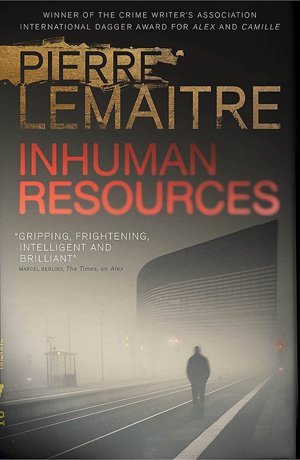 Written by Pierre Lemaitre, translated by Sam Gordon — It is impossible to fit French author Pierre Lemaitre into one neat category. He has written graphic police procedurals like Alex, atmospheric and almost dreamy slow-burn psychological thrillers like Three Days and a Life and even award-winning historical literary fiction. And why would you, when he can delight you with whatever he produces? His latest, Inhuman Resources, shows all the trademark Lemaitre features – consummate storytelling ability and complex, often nasty characters whose motivations nevertheless tug at our heartstrings.
Written by Pierre Lemaitre, translated by Sam Gordon — It is impossible to fit French author Pierre Lemaitre into one neat category. He has written graphic police procedurals like Alex, atmospheric and almost dreamy slow-burn psychological thrillers like Three Days and a Life and even award-winning historical literary fiction. And why would you, when he can delight you with whatever he produces? His latest, Inhuman Resources, shows all the trademark Lemaitre features – consummate storytelling ability and complex, often nasty characters whose motivations nevertheless tug at our heartstrings.
There are far too few crime novels that explore our working environment and how it impacts upon our physical and mental health, or how it might give rise to murderous intent. In this case, the plight of unemployment and age discrimination form the perfect backdrop to a tense psychological thriller. Although there are conspiracies and action scenes, the emphasis here is very much on the psychology of the long-term unemployed, so it is a bit of a slow burner. I am pleased to say that the French specialty of providing biting social commentary via fiction is alive and well. If this were a film, it would be the lovechild of Ken Loach and Christopher Nolan.
Alain Delambre is in his late 50s, lives in Paris and has been unemployed for four years. He used to be a high-powered HR executive, but now he is eking out a living with minimum wage jobs and feeling like a failure in front of his family. So when the opportunity arises to participate in an extreme recruitment process, he is more than ready to give it a go. The set-up, admittedly, sounds suspicious. He has to assess the reactions of senior executives at a company caught up unsuspectingly in a kidnapping scenario. Despite his wife’s misgivings, Alain prepares for this assignment and hopes it will lead to a good permanent position.
Needless to say, things don’t quite go according to plan. There is so much double-crossing and ruthlessness in the air that no one knows who to believe anymore. What started out as a corporate game may soon end up in a real rather than a metaphorical bloodbath. Expect a lot of shifts in your own point of view as you try to decide who the real villains are.
The book is structured in three parts: before, during and after the unconventional assessment centre. The first and third are written in first person from Alain’s point of view, while the second is written by the person running the simulation on behalf of the corporate client. This is a clever strategy, allowing us to see Alain not just when he provides his self-serving explanations and excuses, but also as others see him and perhaps underestimate him. It’s nteresting to observe that the ‘during’ part, which might be called the action thriller part of the novel, is in fact the shortest. The author is clearly far more interested in examining what led up to the dramatic events and their aftermath.
It’s impossible not to feel some sympathy with Alain’s plight, although you may despair at the lengths he is prepared to go to in order to secure a job and regain his professional dignity. His wife certainly feels that it comes at the cost of his personal integrity, but, as always, Lemaitre asks the reader: what would you do in his place? For anyone who has ever been humiliated in a job interview, this is a must read.
You can read our interview with Pierre Lemaitre here. For more crime fiction set in the corporate world, try He Jiahong’s Black Holes or Alan Glynn’s Blood Land.
Quercus
Print/Kindle/iBook
£10.99
CFL Rating: 4 Stars









